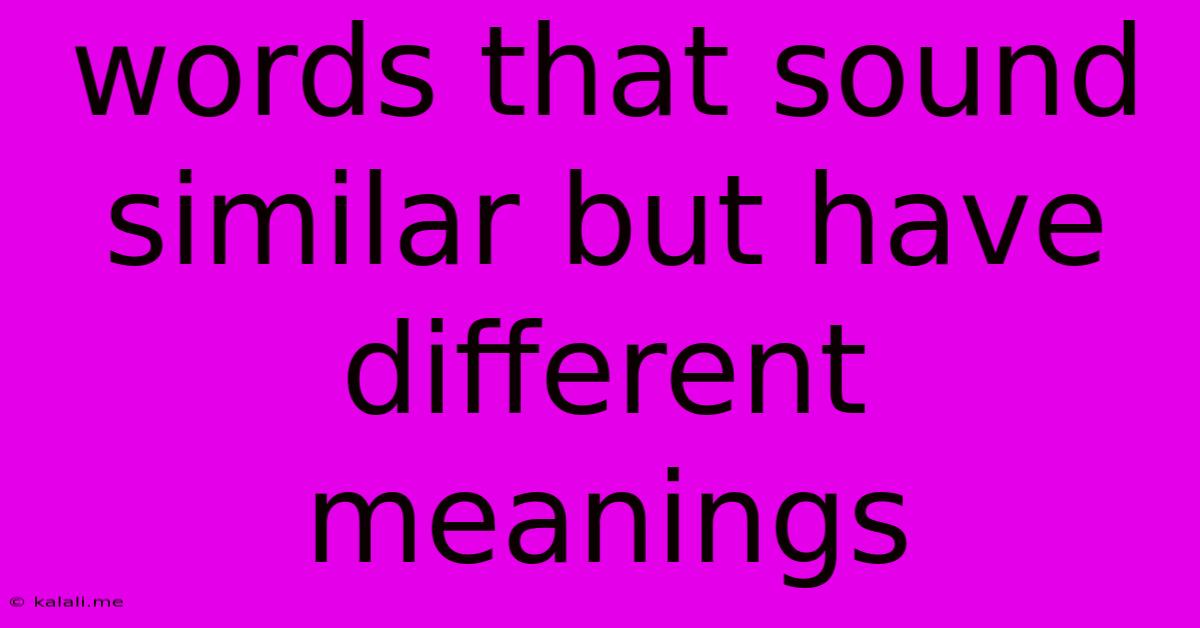Words That Sound Similar But Have Different Meanings
Kalali
Jun 08, 2025 · 3 min read

Table of Contents
Words That Sound Alike But Mean Different Things: Mastering Homophones for Clear Communication
Are you tired of confusing "there," "their," and "they're"? Do you sometimes accidentally use "accept" when you mean "except"? You're not alone! Many words in the English language sound remarkably similar but have vastly different meanings. These words, known as homophones, can easily trip up even the most experienced writers and speakers. Mastering these tricky words is crucial for clear communication, both in writing and speech, and significantly improves your SEO by reducing ambiguity and enhancing readability. This article will delve into some common homophones, helping you understand their differences and use them correctly.
Common Sources of Confusion: A Deep Dive into Homophones
The English language is notorious for its inconsistencies, and homophones are a prime example. These words often stem from different origins, evolving over time to sound alike but retain their distinct meanings. Let's explore some of the most frequently misused pairs:
-
Accept vs. Except: "Accept" means to receive or agree to something. "Except" means excluding or leaving something out. Example: I accept your apology. Everyone went to the party except John.
-
Affect vs. Effect: This pair is notoriously tricky. "Affect" usually acts as a verb, meaning to influence or change something. "Effect" typically acts as a noun, meaning a result or consequence. However, "effect" can sometimes be used as a verb meaning "to bring about" or "to cause". Example: The weather affected our plans. The effect of the medicine was immediate. The new law effected significant changes.
-
There, Their, and They're: This trio is a frequent source of errors. "There" indicates a place or position. "Their" shows possession. "They're" is a contraction of "they are." Example: Put the book over there. That's their car. They're going to the movies.
-
Its vs. It's: "Its" is the possessive form of "it." "It's" is a contraction of "it is" or "it has." Example: The dog wagged its tail. It's raining outside.
-
Your vs. You're: "Your" shows possession. "You're" is a contraction of "you are." Example: Is that your phone? You're very talented.
-
To, Too, and Two: "To" is a preposition indicating direction or purpose. "Too" means also or excessively. "Two" is the number 2. Example: I'm going to the store. It's too hot outside. I have two apples.
-
Hear vs. Here: "Hear" refers to listening. "Here" indicates a place or position. Example: Can you hear me? Put it here.
Strategies for Mastering Homophones
Understanding the definitions is the first step. However, consistent practice is key to mastering these tricky words. Here are some helpful strategies:
- Use a dictionary or thesaurus: Consult these resources when unsure about the correct spelling or meaning.
- Practice writing sentences: Use each word in different sentences to solidify your understanding.
- Proofread carefully: Review your writing thoroughly, paying close attention to these common homophone errors.
- Read extensively: Immersing yourself in well-written material exposes you to correct usage naturally.
Elevating Your Writing and SEO with Accurate Homophone Usage
Correctly using homophones is not just about grammar; it's about clarity and professionalism. In the context of SEO, clear and concise writing is essential for both search engine crawlers and human readers. Ambiguity caused by incorrect homophone usage can negatively impact your search engine rankings. By paying attention to these details, you'll enhance the readability of your content, leading to better engagement and a higher chance of ranking well in search results.
By consistently applying these strategies and focusing on the nuances of these similar-sounding words, you'll significantly improve your writing and strengthen your online presence. Mastering homophones is an investment in clear communication and effective SEO.
Latest Posts
Latest Posts
-
Indexing Phone Numbers In A Data Model
Jun 08, 2025
-
How To Restart Service Using Sudo Command Ubuntu
Jun 08, 2025
-
Do You Need To Peel Sweet Potatoes
Jun 08, 2025
-
Why Do I Get Shocked When I Touch Metal
Jun 08, 2025
-
How To Put Minecraft On Steam
Jun 08, 2025
Related Post
Thank you for visiting our website which covers about Words That Sound Similar But Have Different Meanings . We hope the information provided has been useful to you. Feel free to contact us if you have any questions or need further assistance. See you next time and don't miss to bookmark.